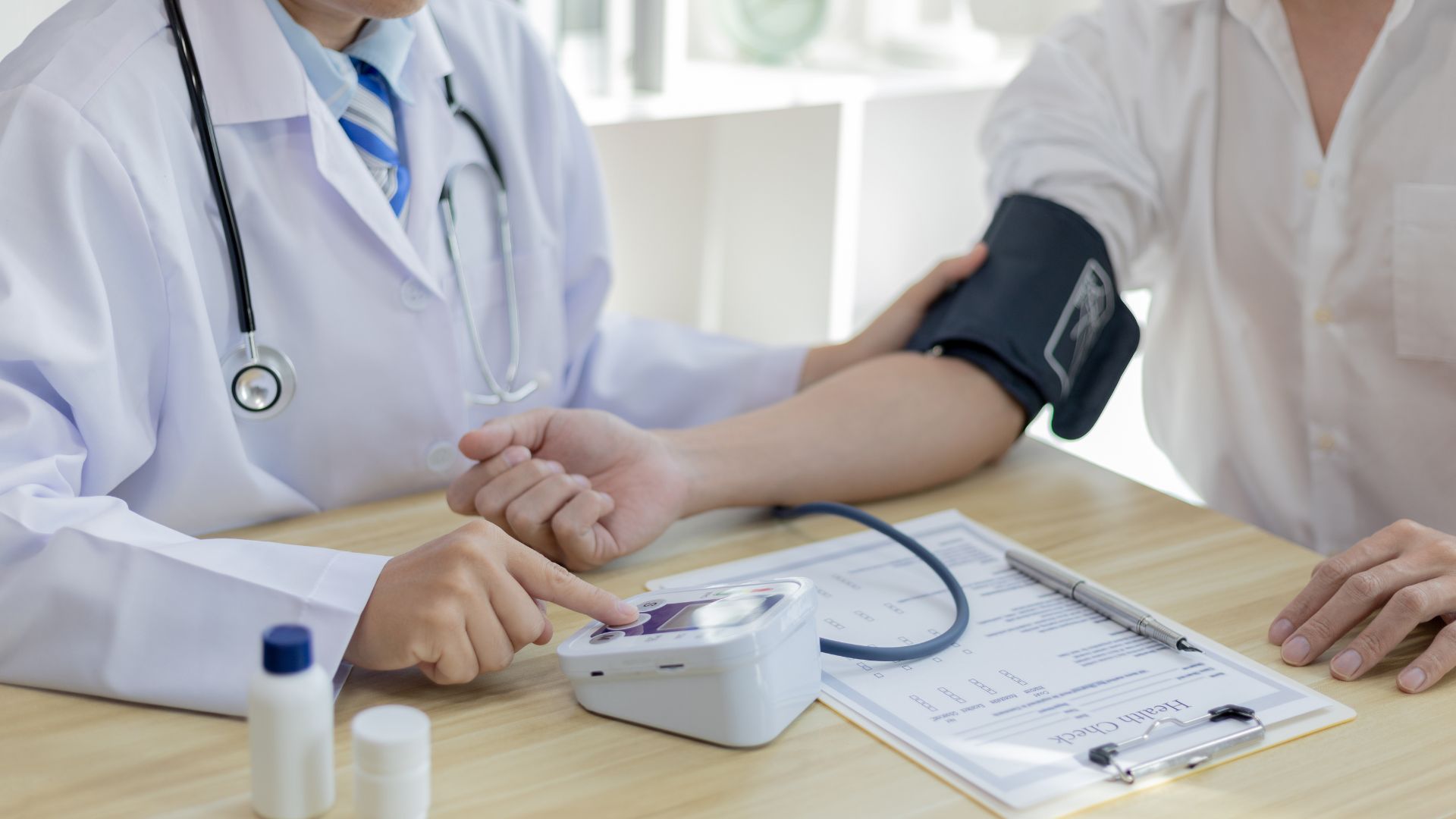Medical examinations for men play a significant role in disease prevention, allowing the early detection of potential health problems. In this article, we will detail the medical procedures that men should undergo and how often.
Blood pressure measurement
Regularly monitoring blood pressure is an essential component of caring for your cardiovascular health. High blood pressure, or hypertension, is a significant risk factor for heart disease and stroke.
It is recommended to measure blood pressure at least once a year to track its values and promptly identify any deviations. Blood pressure measurement is done using a sphygmomanometer and should be performed in a calm state. If you notice any changes, it is advisable to discuss them with a doctor to receive recommendations for further steps, including monitoring and potentially a treatment plan.
Cholesterol level analysis
Cholesterol is a fat-like substance necessary for the normal functioning of the body. However, a high level of “bad” cholesterol (low-density lipoprotein or LDL) in the blood can contribute to the formation of plaque in the arteries, increasing the risk of heart disease.
For the prevention of heart disease, men are recommended to undergo cholesterol level analysis every four to six years. However, if you have risk factors such as a family history or dietary issues, the doctor may recommend more frequent tests. Cholesterol analysis is done through a blood test. Based on the results, the doctor can determine whether corrective measures are necessary, such as dietary changes or medication.
Blood sugar level testing
Regular monitoring of blood sugar levels is necessary for detecting diabetes or prediabetes. Diabetes is a chronic condition that affects your body’s ability to manage blood sugar levels. It can lead to serious complications, such as damage to the cardiovascular system, nerve damage, and kidney problems.
For men with a family history of diabetes or other risk factors such as obesity or a lack of physical activity, more frequent blood sugar level tests may be required. Typically, these tests include taking a fasting blood sample, one after waking up, and another after consuming a specified amount of glucose. The results allow the doctor to identify metabolic disorders and take appropriate measures, including dietary adjustments, physical activity, and medications if necessary.
Prostate cancer screening
Prostate cancer is one of the most common cancers among men. Two main types of screening are conducted for its early detection:
- Digital Rectal Examination (DRE): During a DRE, the doctor examines the prostate gland, located near the rectum, to detect any anomalies or enlargement. This is a quick and relatively straightforward procedure. It is important to note that while DRE can help detect changes in the prostate, it does not exclude the need for other screening methods.
- Prostate-Specific Antigen (PSA) Blood Test: This test measures the level of PSA in the blood. Elevated PSA levels may indicate prostate issues, including cancer. However, it’s essential to consider that high PSA levels do not always indicate cancer, and low levels do not guarantee its absence. The interpretation of the PSA result and the need for additional tests should be discussed with a doctor.
Regarding the frequency of screening, it is an individual decision based on age, family history, and risk factors.
Colorectal cancer screening
Colorectal cancer includes cancers of the large intestine and rectum and is a serious disease. The following methods are used for screening:
- Colonoscopy: This is a procedural examination in which a doctor uses a flexible tube with a camera (colonoscope) to inspect the inner walls of the large intestine. Colonoscopy can detect polyps and other changes that may be precursors to cancer. Starting at the age of 45, or even earlier if there is a family history of colorectal cancer, it is recommended to undergo this examination.
- Fecal Occult Blood Tests: These tests detect traces of hidden blood in the stool, which may indicate problems in the large intestine. The appropriate age to begin screening for occult blood in the stool also typically starts at 45, or earlier if there are risk factors.
Assessment of skin health
Early detection of skin cancer, including melanoma, plays a critically important role in maintaining one’s health. Regular visits to a dermatologist can contribute to the timely detection of changes in the skin. This is especially important for men with a family history of skin cancer. When non-standard changes are noticed, it is advisable to promptly consult a doctor for a more detailed assessment and potential treatment.
Self-examination for testicular cancer
Testicular cancer, while not as common as some other types of cancer, is a serious disease that can affect men of all ages. Periodic self-examination can help detect pathological changes in the early stages. Here’s how you can perform self-examination:
- Visual Examination: Visually assess the testicles and the surrounding area. Pay attention to any changes in the shape, size, or texture of the testicles. The presence of lumps in the testicles and swelling can be signs of problems.
- Palpation: Gently feel each testicle. It should be smooth and tender. If you notice any lumps, irregularities, or painful areas, consult a doctor immediately.
- Regularity: It is recommended to perform self-examination once a month, preferably after a warm bath or shower when the scrotum is relaxed.
If you notice any changes, do not delay and consult a doctor for a more detailed examination. Early detection of testicular cancer increases the chances of successful treatment.
Bone density measurement
Osteoporosis, a rare bone tissue disorder, is not limited to women alone. Men are also susceptible to this condition. Osteoporosis makes bones fragile and more prone to fractures.
- Risk Factors: Bone density testing may be recommended for men with risk factors such as a family history of osteoporosis, long-term use of certain medications like glucocorticoids, and digestive disorders that can hinder calcium absorption.
- Densitometry: Bone density is typically measured using a method called densitometry. It is a painless procedure that measures bone density, often done at the spine and hips.
- Frequency: The frequency of bone density measurement depends on individual risk factors and the doctor’s recommendations. Typically, starting around the age of 50, men are advised to discuss the need for this procedure with a specialist.
Bone density measurement helps determine the condition of bone tissue and whether treatment or osteoporosis prevention is necessary.
Lung cancer screening
Smokers or former smokers are at risk of developing lung cancer. Lung cancer screening is crucial for early disease detection, increasing the chances of successful treatment.
- Low-Dose CT Scans: Low-dose computed tomography (CT) scans are typically used for lung cancer screening. These scans use minimal radiation and can detect early stages of the disease.
- Risk Factors: Assessing the risk of developing lung cancer includes factors like smoking history, the number of cigarettes smoked, age, presence of other lung diseases, and family history of lung cancer.
- Screening Frequency depends on individual characteristics and is discussed with a doctor.
Lung cancer screening helps detect the most common lung disease and improves the chances of recovery.
Ophthalmological examinations
Regular eye examinations are an essential part of maintaining your health. Regular eye check-ups with an ophthalmologist help detect and correct various vision problems, such as myopia, hyperopia, or astigmatism.
Ophthalmological examinations can also help identify other eye problems, such as cataracts or glaucoma. Glaucoma is a severe eye condition that can lead to vision loss. Regular examinations help detect early signs of glaucoma, allowing for early treatment to prevent further complications.
It is recommended that men have ophthalmological examinations at least every two years. However, if you wear glasses or contact lenses or have vision problems, your doctor may recommend more frequent visits.
Dental visits
Oral health is essential for overall well-being and can affect your digestion, comfort, well-being, and even sleep. Regular visits to the dentist are a vital aspect of your health.
Regular check-ups and comprehensive teeth cleaning by a dentist can help prevent dental problems like cavities and gum diseases, as well as the formation of dental plaque and tartar. The dentist can also provide advice on proper dental care, recommend the right toothbrush, teach you how to use dental floss, and suggest other dental care products suitable for your needs.
It is recommended to visit the dentist at least once every six months to ensure optimal oral health care. However, in case of any problems or oral pain, seek immediate assistance from a healthcare provider.
Screening for sexual infections
Regular screening for sexual infections allows for the detection of diseases such as HIV, chlamydia, gonorrhea, and others. Early detection enables prompt treatment and prevents the further spread of infections. The frequency of screenings can be individualized based on each man’s sexual activity and additional risk factors.
Vaccination
Vaccination provides important protection against infectious diseases and plays a key role in maintaining your overall health. Regular vaccination is essential for protecting both yourself and those around you.
Vaccination includes vaccinations against various diseases such as the flu, tetanus, and others. This helps to prevent diseases and their complications. It is important to keep up with the vaccination schedule according to your doctor’s recommendations. The vaccination schedule may vary depending on age and risk factors.
Blood analysis
Regular blood tests help assess your overall health. A clinical blood analysis usually involves the examination of elements in your blood, such as the number of red and white blood cells, hemoglobin, platelets, and other indicators. This data can help the doctor detect anemia, inflammatory processes, or the presence of infections.
On the other hand, a biochemical analysis focuses on the levels of chemical substances in your blood, such as glucose, proteins, liver enzymes, and other metabolites. It can provide information about the functioning of organs such as the kidneys and liver, and reveal any imbalances. It is important to note that your doctor may choose specific tests based on your individual risk factors and medical history.
These analyses are recommended to be conducted regularly as part of an annual medical examination or when there is suspicion of any illnesses. They help detect problems at an early stage, ensuring more effective treatment and maintaining overall health.
Assessment of mental health
Mental health also holds great significance for your overall well-being. Regular consultations with a psychologist give you the opportunity to more thoroughly assess your emotional and psychological state.
Regular sessions with a psychologist can be beneficial in identifying issues such as depression, anxiety, stress, or other disorders. The assessment of mental health can help you develop skills for managing and maintaining your emotional balance.
Keep in mind that your psychological state is closely connected to your physical health and plays a vital role in overall well-being. Regular consultations help identify and address mental health issues, laying the foundation for a healthy and happy life.
The frequency and periodicity of such consultations may vary depending on individual medical history, risk factors, and age.








